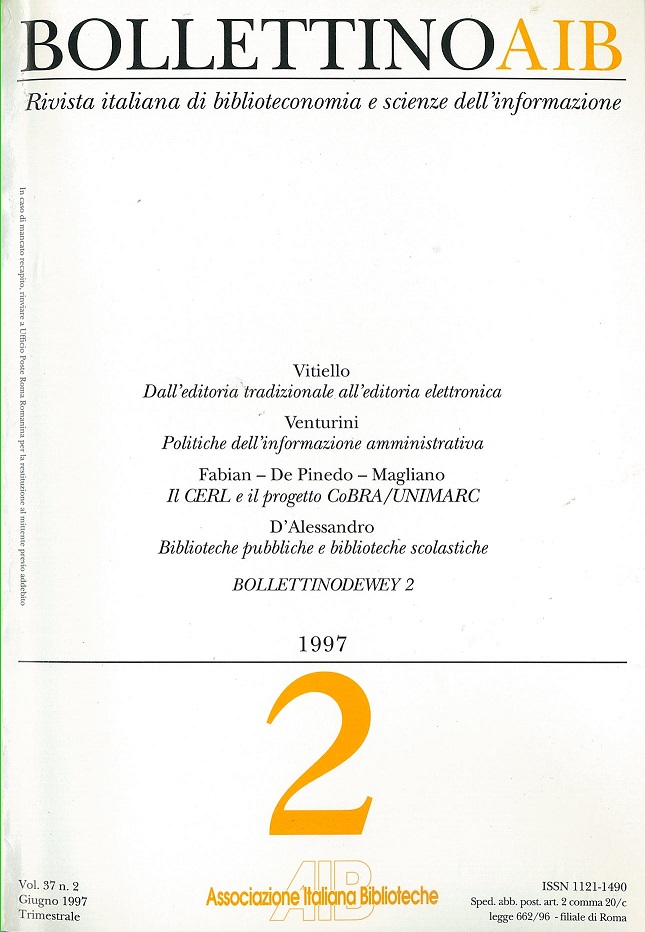From traditional to electronic publishing: professional relations, istitutional policies and spaces of democracy
Main Article Content
Abstract
The cultural impact of information technologies is now being discussed outside the closed circles of academia and specialists and has acquired a national and international political dimension. For an organisation such as the Council of Europe, which since 1949 has defended democracy and safeguarded human rights, the relation between technology and culture and reflection on how the fundamental freedoms of the individual express themselves within the spaces of electronic communication are of primary importance.
This is particularly true of the world of publishing. Publishers have benefited considerably from the diffusion of the new technologies. However, despite this, they are generally wary of electronic publishing for reasons which range from the costs to the lack of secure legal protection and the absence of a proper distribution circuit. In conclusion, even today, that amazing concentrate of pluralistic expression and democratic practice to be found in the catalogues of many publishers chooses the laborious and economically disadvantageous path of traditional production and distribution.
There are many external factors which condition, to some extent, the development of electronic publishing. The "third revolution" of reading, after the transition from the volumen to the codex and, in the XVIII century, from an "intensive" to an "extensive" style, has still to take place. Reading, in reality, rhymes with writing: while the latter remains linear, continuous, a producer of texts, the former will faithfully follow the same course. The spread of electronic publishing therefore entails a new drive for literacy, which aims to revise the three fundamental skills (reading, writing and counting) and ensure the learning of a "minimum level" of computer knowledge, that minimum needed to prevent one drowning in the ocean of Internet.
All the professional figures are changing their functions. Librarians offer a curious example of this repositioning on the book chain. Starting from the early 1970s, they have been involved in informatics and have hence found themselves experimenting avant-garde solutions in information processing, at a time when the other book professionals remained faithful to traditional work techniques and communication practices. Emboldened by this technological advantage, many libraries could be tempted to redefine themselves as economic players and producers of information. This confusion of roles between librarians and publishers does not, however, serve the interest of culture, above all in a historical period in which primary and functional illiteracy are further compounded by technological illiteracy. A recent survey by the OECD shows that adult illiteracy is on the increase.
The first programmes, both Italian and international, for electronic publishing focused on content, with a distinct preference for optic technology. What is rather surprising is that electronic publishing is tending to exalt technological value-added - and, therefore, the capacity to combine text, image and sound - while neglecting the potential of communication - the possibility, for example, to generate texts whether on electronic or paper media, from an electronic source. Attention should therefore be paid to the entry strategies of small- and medium-sized publishers in the electronic environment and to the technological and econometric models which can define the steps necessary to adapt the traditional book chain to the network environment.
The project "New Book Economy", inspired by the Council of Europe and financed by the EU structural funds (ADAPT programme), aims to address these problems. The project has been implemented in Italy, Germany and the Netherlands, respectively by the Ministry of Cultural Heritage, the Internationale Buch Agentur and the Hogeschool van Amsterdam. The project shall run for two years and aims to involve the various players of the book chain in innovative projects and to initiate activities aimed at increasing awareness and the related training.
This electronic publishing project envisages the involvement not only of the commercial players of the book chain but also of the non-commercial players (librarians, readers), and their co-operation. The final objective is to ensure that the migration of the melting pot of opinions, experiences and relations contained in texts published by small- and medium-sized publishers to the communication network environment is quick and takes place under the optimum conditions, before the various combined economic and socio-cultural factors make their public expression increasingly difficult. The New Book Economy is therefore also a democratic battle deserving of investment of energy and resources.
Article Details

This work is licensed under a Creative Commons Attribution-ShareAlike 4.0 International License.
